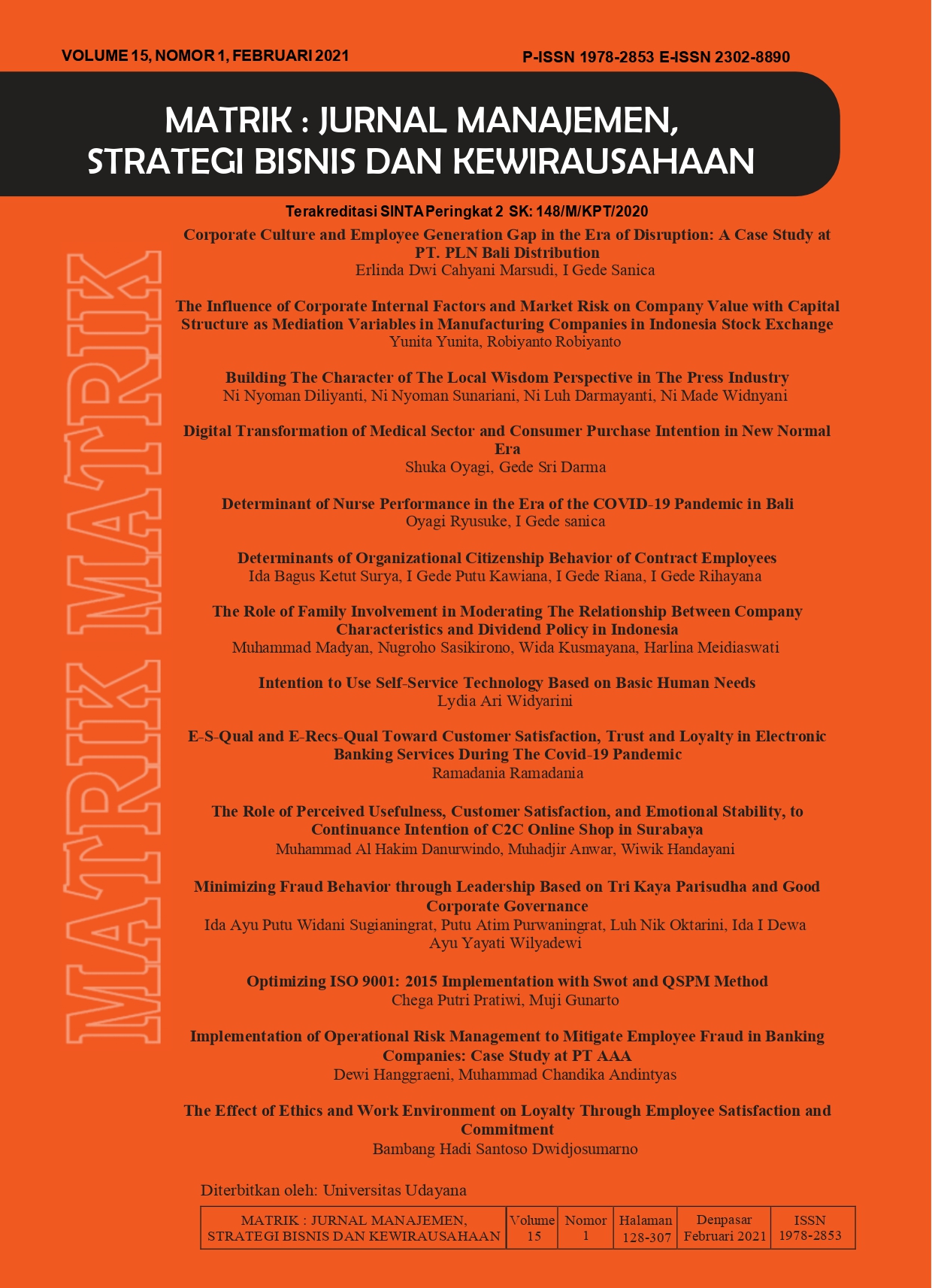Intention to Use Self-Service Technology Based on Basic Human Needs
Abstract
In the context of technology developing in the society, Self-service technologies (SSTs) are becoming increasingly popular in retailing contexts, public service, banking, ticketing, parking, tourism, etc. Previous theories of SST adoption have largely ignored the basic human needs, such as competence, autonomy and relatedness that drive customer motivation and the use of SSTs in Indonesia. We address this theoretical gap and examine self-determination theory (SDT) to the Self Service Technology in general. Based on the argument proposed by SDT, self-determined motivation is hypothesized to mediate the relationships between autonomy, competence, and perceived anonymity, and the intention to use SSTs. Data collected from respondents form a structural equation model and support these hypotheses.
This research shows that there is relation autonomy and competence to self determination and adoption intention to SSTs. There is no good relation anonymity to self determination and adoption intention to SSTs. There is relation Self Determination to adoption intention to SSTs. Self Determination mediate relationship of autonomy and competence on adoption intention, but Self Determination is not good mediation relationship of perceived anonymity on adoption intention to SSTs.
Downloads
References
Ajzen, I., 1991, The Theory Of Planned Behavior, Organization Behavior and Human Decision Processes 50, 179–211
Baard, P.P., Deci, E.L., Ryan, R.M., 2004, Intrinsic Need Satisfaction: A Motivational Basis of Performance and Well-Being In Two Work Settings, Journal of Applied Social Psychology 34, 2045–2068.
Bendapudi, N., Leone, R.P., 2003, Psychological Implications of Customer Participation in Co-Production, Journal of Marketing 67 (1), 14–28.
Chatzisarantis, N. L. D., Hagger. M. S., Smith. B., and Sage. L. D. 2006. The Influences of Intrinsic Motivation on Execution of Social Behaviour within the Theory of Planned Behaviour. European Journal of Social Psychology (36):229-237.
Compeau, D.R., Higgins, C.A., 1995, Computer Self-Efficacy: Development of a Measure and Initial Test, MIS Quarterly 19 (2), 189–212.
Dabholkar, P.A., Bagozzi, R.P., 2002. an Attitudinal Model of Technology- Based Self- Service: Moderating Effects of Consumer Traits and Situational Factors, Journal of The Academy of Marketing Science 30 (3), 184–201.
Deci, E. L. and Ryan, R. M. 1985. Intrinsic Motivation and Self-Determination in Human Behavior. New York: Plenum. 200.
Davis, F.D., 1989, Perceived Usefulness, Perceived Ease Of Use, and User Acceptance of Information Technology, MIS Quarterly 13 (3), 319–340.
Deci, E.L., Eghrari, H., Patrick, B.C., Leone, D.R., 1994, Facilitating Internalization: The Self-Determination Theory Perspective, Journal of Personality 62, 119–142.
Deci, E.L., Ryan, R.M., 1991, A Motivational Approach To Self: Integration in Personality. In: Dienstbier, R. (Ed.), Nebraska Symposium on Motivation: Vol. 38, Perspectives on Motivation (Pp. 237–288). Lincoln: University of Nebraska Press.
Deci, E.L., Ryan, R.M., 2000a, Self-Determination Theory and The Facilitation of Intrinsic Motivation, Social Development, and Well-Being, American Psycholo-Gist 55 (1), 68–78.
Deci, E.L., Ryan, R.M., 2000b, Intrinsic And Extrinsic Motivations: Classic Definitions and New Directions, Contemporary Educational Psychology 25 (1), 54–67.
Deci, E.L., Ryan, R.M., 2008, Facilitating Optimal Motivation and Psychological Well-Being Across Life's Domains, Canadian Psychology 49, 14–23.
Egger, F.N., 2000, Towards A Model of Trust for E-Commerce System Design, Working Paper, Center for User–System Interaction. Eindhoven University of Technology.
Firat, A.F., Dholakia, N., Venkatesh, A., 1995. Marketing in A Postmodern World. European Journal of Marketing 29 (1), 4–56
Fishbein, M., Ajzen, I., 1975. Belief, Attitude, Intention, and Behavior: an Introduction to Theory and Research. Addison-Wesley Pub
Geisser, S. 1975. The Predictive Sample Reuse Method With Applications. Journal of the American Statistical Association 70: 350, 320-328.
Hair, J. F., Sarstedt, M., Ringle, C., and Mena, J. 2012. An Assessment of The Use of Partial Least Squares Structural Equation Modeling in Marketing Research. Journal of the Academy of Marketing Science 40: 414-433.
Higgins, E.T., Spiegel, S., 2004. Promotion And Prevention Strategies For Self- Regulation: A Motivated Cognition Perspective. In: Baumeister, R.F., Vohs, K.D. (Eds.), Handbook of Self-Regulation: Research, Theory and Applications. Guil- Ford Press, New York.
Knee, C. R., Hadden, B. W., Porter, B. W., and Rodriguez, L. M. 2013. Self-Determination Theory And Romantic Relationship Processes. Personality and Social Psychology Review. 4. 307–324. doi:10.1177/1088868313498000.
Lengnick-Hall, C.A., 1996, Customer Contributions to Quality: A Different View of The Customer-Oriented Firm, Academy of Management Journal 21 (3), 791–824.
Leung, Larry Sau Kei, Margaret J. Matanda.2013. The Impact of Basic Human Need on the Use of Retaileing Self Service Technologies: a Study of Self Determination Theory. Journal of Retailing and Consumer Services.20 (2013) 549-559
Robinson, L., Marshall, G.W., Stamps, M.B., 2005, Sales Force Use of Technology: Antecedents To Technology Acceptance. Journal of Business Research 58 (12), 1623–1631.
Rogers, E.M., 2003, Diffusion of Innovations, Fifth Ed. Free Press, New York.
Stone, M. 1974. Cross Validatory Choice and Assessment of Statistical Predictions. Journal of the Royal StatisticalSociety 36(2): 111-147
Twenge, J.M., Baumeister, R.F., 2005, Social Exclusion Increases Aggression and Self- Defeating Behavior While Reducing Intelligent Thought and Pro-Social Behavior. In: Abrams, D., Hogg, M.A., Marques, J.M. (Eds.), The Social Psychology Of Inclusion And Exclusion. Psychology Press, New York, Pp. 27–46.
Van den Broeck, A., Vansteenkiste, M. and De Witte, H. 2008. Self – Determination Theory: A Theoretical and Empirical overview in Occupational Health Psychology. In J. Houdmont and S. Leka (Eds) Occupational Health Psychology: European Perspectives on Research. Education and Practive Vol. 3. (pp. 63 – 88). Nothingham: Nothingham University Press.
Williams, G.C., Rodin, G.C., Ryan, R.M., Grolnick, W.S., Deci, E.L., 1998, Autonomous Regulation And Long-Term Medication Adherence in Adult Outpatients, Health Psychology 17, 269–276.
 This work is licensed under a Creative Commons Attribution-ShareAlike 4.0 International License.
This work is licensed under a Creative Commons Attribution-ShareAlike 4.0 International License.

















